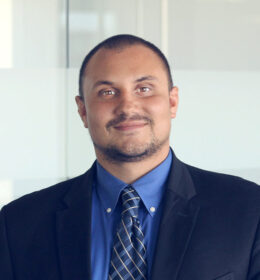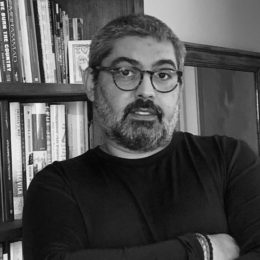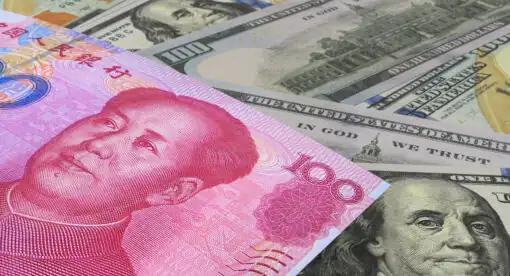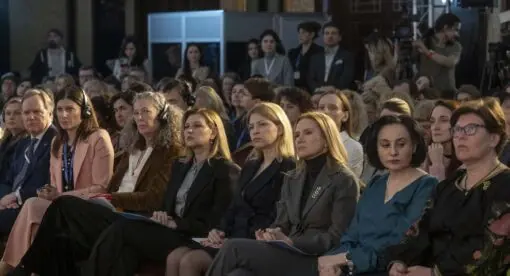In this edition of The New Lines Institute Middle East Center’s Post-Assad Podcast series, Middle East Center co-director Nicholas A. Heras sits down with Nidal Betare to assess the potential for a Syrian-led, inclusive process of democracy-building in post-Assad Syria. Betare is a Palestinian-American who was born and raised in Syria, and a well-known expert on civil society and the Syrian political opposition. They engage on a wide-ranging discussion on how Syrian civil society can lead its country to engage in a process of reconciliation across Syria’s diverse communities after a decade and a half of war, and a half-century of the rule of a brutal authoritarian regime. Betare and Heras also tackle the subject of what the vibrant and active Syrian-American community can do to help rebuild the country and make it more prosperous than ever before.
Nicholas Heras:
Hello, my name is Nick Heras, and I am the co-director of the Middle East Center at the New Lines Institute for Strategy and Policy. I will be your host for today’s conversation on the role of Syrian political activism in inspiring the revolution that removed the Assad regime from power and the prospects for democracy in a post-Assad Syria.
Joining me for this conversation is an outstanding analyst, Nidal Betare. Nidal is a Palestinian-American who was born and raised in Syria, and he is a well-known expert on the Syrian political opposition. He is the managing director of People Demand Change, a research and international aid and development firm that operates in the Middle East and North Africa region, including with extensive operations in all regions of Syria. Welcome, Nidal, and thank you for joining me for this discussion.
So Nidal, I want to start by asking you, what role can longtime Syrian opposition activists play in developing the post-Assad political order?
Nidal Betare:
Well, first of all, thank you, Nick, for this invitation and giving me this opportunity. Before I answer your question, I just want to take the opportunity to congratulate everyone for this victory for the fall of the Assad regime. I would like just to remember all these people who fell around the road from the beginning of the uprising in 2011 until this day, including the activists, the civil society activists, who actually suffered tremendously under the Assad regime before the revolution and during the revolution.
I just want also to, in a brief introduction, I just want to say that the Syrian civil society and the political activism in Syria has been always vibrant, even during Hafez al-Assad’s era and during Bashar al-Assad’s. Bashar al-Assad in 2005, he really cracked down on all the Syrian civil society activists and especially those who worked in the political space calling for reforms in Syria, and many of them were imprisoned in Sednaya Prison. Many of them were released and others were disappeared. Now we know that they are no longer there, and they were liquidated in the prison.
So right to your question now, during the revolution and then the war and the conflict, I mean, there are so many terminologies are being used there. The Syrian civil society has been under a lot of support and was exposed to many other fields other than the political activism and supported by other countries like USAID or the U.S. government in general, and the EU and specific EU countries like Germany for example, who really played critical role in developing the capacity of the Syrian civil society. So the Syrian civil society during the last 13 years have piled up a lot of experience in dealing with active conflict situation. So now we will see the Syrian civil society transforming from one state to another.
On the top of my mind when I talk or think of the role of the Syrian civil society, the new Syria, something crosses my mind, which is it is impossible, almost impossible for the new Syria to be rebuilt without the civil society because the civil society will be the backbone of rebuilding Syria on every single level and for many reasons. One of them, and the most important reason for that is that the Syrian civil society throughout the last 13 years was the most active side that took over the governance of many areas in Syria and over the humanitarian aid, over the conflict resolution, took over every single aspect in the Syrians’ lives because there was a complete absence of any other governance institution during the conflict.
Reconciliation might be the most important task that the Syrian civil society will be tasked to do, given the rapport and the trust that they built with the Syrian communities and every governorate in Syria and the experience that they gained during the conflict. I don’t see a new Syria without the Syrian civil society, if this makes sense.
Reconciliation, because of the nature of the Syrian society, because of the diversity, because of the division that al-Assad regime intentionally imposed on the Syrian society over the last 53 years, the civil society is the only side or maybe institutions that I can see clearly that they will be leading the reconciliation efforts in the new Syria.
Nicholas Heras:
Nidal, could I ask you because this is an excellent point that you make about the idea of reconciliation, and as you pointed out, civil society will have to play a role in healing all the wounds that have happened in Syria over the last decade and a half and much longer over the last half century of the Assad regime’s rule. I want to ask you from your point of view, what does this reconciliation process look like if it’s led by civil society?
Nidal Betare:
So just I want take a step back here and emphasize a very important point just for the sake of fairness and justice because the Syrian civil society and civil society activists, they were the backbone of the Syrian revolution. Let’s just remember together, Nick, because also you were engaged in one capacity or another for the last maybe more than like 15 years now in Syria and during the conflict. When the Syrian revolution started, the Syrians established what, if you remember the coordinates or the coordinations, which was the local entities built up from the bottom up by local activists in every neighborhood in Syria to organize the Syrian revolution, protest demonstrations, one narrative if they could, and let’s remember together the founder of these coordinations, Razan Zaitouneh.
So this situation is nothing new for the Syrian civil society. They have always been engaged in their communities in one capacity or the other. So it’s not going to be something new that they will do. It’s going to be maybe a new approach that they will have, and maybe now they are in the process of figuring out what is the approach that we can adopt to move forward with the role of the Syrian civil society and reconciliation.
I’ll tell you that they have already started, and they took a step by forming local entities. It does not have a name yet, but these entities today in almost every city in Syria, and their role is to try to find solutions for any conflict they had or they might have in the future in their neighborhoods and their cities. So there is a process that has been launched already by the Syrian civil society to be engaged or to engage on the communal level across Syria with some exceptions in northeast Syria now, and maybe we can talk about that in details later on today.
So how they will institutionalize this process, it’s still not clear what is the form or the shape of the new Syria. It is not clear, but on this reconciliation issue, they have already took the first step, especially in the diverse communities where we see different religious groups, minorities and ethnicities. They live together, and so far they are doing well.
I think one issue, Nick, that I don’t know if we paid attention to it or now we started to pay attention to, is that all the barriers that the Assad regimes, the father and the son, built over the last 53 (years) it seemed to be like they are very fragile and they collapsed once Bashar al-Assad and the Syrian security services and the army dissolved themselves during the operation of Hay’at Tahrir al-Sham and the other groups. Because it is phenomenal what we have seen that the minimal loss of lives, which every life is precious, but we did not see mass killing, which was the thing that everyone was worried about.
We saw that everyone is welcoming the armed groups who conquered all the governorates in Syria from Aleppo to the south. So I think the task that the Syrian civil society, the task of reconciliation, it will be easier than what we expected before the fall of Bashar al-Assad. So in other words, I think it’s not going to be as tough as we were imagine. I think it’s going to be more about stopping revenge, vengeance and making Syria people feel that Syria is for all Syrians. This is something we are all waiting to see in the next weeks, maybe months to come.
Nicholas Heras:
Nidal, can I ask you about this important point about northeast Syria and the autonomous administration that the U.S.-backed Kurdish-led Syrian Democratic Forces have instituted. I think it’s worthwhile for us to deep dive your perspectives on how do you reintegrate these sort of local coordinating council structures, this protodemocracy in Syria with the autonomous administration in northeast Syria that’s U.S. backed. What does that process look like in the best-case scenario, and what are some challenges that we should all be concerned about moving forward?
Nidal Betare:
Sure. So for the last maybe four years, I personally have been engaged on almost daily basis with the situation in northeast Syria through the programming that we were doing in that region. To be quite honest with you, Nick, I was very, very, very worried that northeast Syria was on the verge of a civil war before the falling of Bashar al-Assad.
To be more honest with you, the U.S. policy in northeast Syria, which is not clear for anyone until now, which only has one task to defeat ISIS, did not really pay attention to the civil society and to the fabric of the communities in northeast Syria. So the situation was extremely bad.
It was extremely bad because it was very, very, very tough and hard to an extent, which it was almost impossible to build governance institutions in northeast Syria. It doesn’t matter how many pieces of training we provided people with, it does not matter how many money we poured in that area in Deir ez-Zor, in Raqqa, in Al-Hasakah, Al-Qamishli, and all the governorates of northeast Syria. For one reason because until this moment, Nick, in northeast Syria people do not feel that they are connected to the victory and the happiness of the Syrians in Damascus and the other areas where the regime fell.
The issue about the governance in northeast Syria, I can tell you that the process for engaging the Arab communities in northeast Syria, it was very limited and it was very minimal, and it did not really develop a relationship between the communities and the new governance institutions that the Self Administration Authority, or SAA, tried to build.
In the last two months I was working on a paper, internal paper for our organization about how communities in Deir ez-Zor [inaudible 00:14:40] and the governorate and communities in Raqqa feel about the governance institutions or SAA. It was really striking that one of the interviewees who I interviewed and who’s local to the Deir ez-Zor city, he told me that, “I feel that I live under a colonial power,” which is very, very warning, alarming and concerning. It’s something I have heard from different people while working in northeast Syria. They feel that there is a barrier between them and the Self Administration Authority because it’s not quite a state, it’s not a state institution, and it is almost also impossible for it to develop into an entity that is inclusive for all Syrians today, which is something I found that very interesting to hear from people.
Now we are in a new era, and we are in a new situation and people are less worried, which also really was surprising to me that I thought that people will be more worried, will be more scared that there will be some separations from northeast from the rest of Syria. But all people who I talked to in the last three or four days, they think, especially after the protest when people took the streets and Deir ez-Zor and the murder of 10 civilians by the SDF, I think things calmed down a little bit now and people that there might be a peaceful transformation of the situation in northeast Syria to be reunited with Damascus in one way or the other.
But it is very important to always remember that until this day northeast Syria is still disconnected from what happened in Damascus. Part of the obstacles that it’s very hard to solve now is the nature of the U.S. presence in Syria and as a result their policies toward that region. This is where the concern is now. The policy today cannot lost with the new administration and with the new administration, there should be a new approach to how to solve this very fundamental issue in stabilizing all of Syria because if we don’t stabilize northeast Syria, Syria will never be stable.
Nicholas Heras:
Nidal, thank you so much for that implementer’s point of view, and you’re deeply, deeply knowledgeable about events as they play out on the ground, the really nitty-gritty details. So I want to get your perspective on the other big question, which is can Hay’at Tahrir al-Sham, can it actually develop an inclusive pluralistic system that accounts for all the various different nuances in Syria on a region-by-region basis? What’s your perspective on that?
Nidal Betare:
I’ll give you the simple answer: No. And I’ll explain why. Because like Hay’at Tahrir al-Sham, whether it is on the terrorist list or even when, and there are a lot of indicators that it’s going to be lifted from the terrorist list, fundamentally Hay’at Tahrir al-Sham and the other, and all the groups that are under the umbrella of Hay’at Tahrir al-Sham, they are Islamists. Islamism, this is my own opinion, Islamism in general in a diverse country like Syria cannot really build a comprehensive inclusive institutions because of the ideological obstacles that fundamentally impacts any attempt to build a secular constitution, for example. So I think moving forward there is a big question and there is an important step that Hay’at Tahrir al-Sham should take, which is dissolving Hay’at Tahrir al-Sham itself and dissolving all the armed groups under its umbrella because this is where the danger exists now in the process of transforming Syria into a new era.
The door should be open for the technocrats, for Syrians, who I believe 100% that they have the knowledge and they have the capacity and they have the skills put together a new inclusive constitution for Syria that includes all ethnicities and all sects and all religious groups and minorities and answers to the concerns of every Syrian at this point.
Before we started recording this, I was talking to my aunt actually who lives in Damascus, and she is celebrating every day in the streets and everywhere with her husband and their kids. When I asked her this question about how she feels, she said that, and I’m going quote what she said, “We are extremely happy, but we are still concerned because we don’t know how this group will handle the situation.” Although all indicators and all people who I talked to in the last 10 days since last Sunday until today about the situation on the ground … But I talk to people from different religious groups and ethnicities and otherwise Christians, and they all say that the situation is good, and there is a lot of respect that the soldiers and the members of Hay’at Tahrir al-Sham and other groups are showing to people in the street to an extent that it is almost hard to believe that they will be treated this way from an authority because of the trauma of Bashar al-Assad regime and the PTSD that Syrians all have from the police and cops and even like an employee in the government.
So this situation is good, but it is important for Hay’at Tahrir al-Sham to realize that and to remember this, which is very, very important point in the narrative of the Syrian revolution that the Syrian revolution started actually by people from all Syrians, Mashaal Tammo who is Kurdish in Qamishli and Bashar Al Shahadeh who is Christian from Damascus and other people from Suwayda who are Druzes.
They all suffered, some of them were killed. So the blood who was shed in the last 13 years is the blood of all Syrians, not only the blood of the Sunni Muslims in Syria, and HTS today is where it is because of the sacrifices of all Syrians, not the sacrifices of Jabhat al-Nusra or HTS only. So it is very important for us to emphasize this narrative, and it’s very important for al-Jolani and Ahmed al-Sharaa to remember that and use it as compass when he plans what’s next. I really advise him to start the process of including all Syrians because until today himself, he dominates the whole scene in Syria.
Nicholas Heras:
Nidal, I think this is a perfect segue into my last sort of big picture question for you, which is, in your opinion, what should be the role of Syrian-Americans and the United States government in helping to support a future Syria that’s pluralistic, inclusive, democratic, transparent to its people and also able to defend itself from external aggression? What should be that role of the Syrian Americans and the U.S. government in that process?
Nidal Betare:
Sure. Let me start with the U.S. government because it is very concerning given the level of presence of the United States in Syria. So the United States between 2010 and until today we are 2024, the end of 2024, the United States put almost about $17 billion into supporting the Syrians throughout the conflict, whether was it through humanitarian aid or other development programs across most of Syria directly, through USAID and other agencies or through the United Nations. This role should be continued.
The most important two things that I think the United States should consider, especially for Trump’s administration. The first one is to, because we all know that President Trump is a fan of withdrawing from Syria, so there must be a very calculated and planned withdrawal from Syria so we don’t see something similar to what happened in Afghanistan. This plan should take some time to take care of the U.S. allies in Syria that the U.S. built over the last 13 years in Syria, specifically the Kurdish minority because they should not be left alone to face any conflicts might arise if the U.S. withdraws suddenly from Syria.
The second one is to continue supporting and investing in Syria and the future Syria. This is why I’m going to say something very general because most of the Americans knew Syria through the war, but they didn’t know the stable Syria. They did not really get to know the Syrian people who are one of the most peaceful people you could ever see in your life on earth. They are extremely peaceful. What worries me about, just back to the former question, previous question, what worries me about Hay’at Tahrir al-sham is not extremism, it’s not radicalism because this will be rejected by the Syrian society, all of it including the Muslim Syrians. But the Syrian themselves, they are extremely peaceful, and I’m sure that it’s going to be beneficial for the U.S. government to build a bridge with the new Syria and to meet the Syrian people in their new status and their new conditions and it’s going to be a good investment.
Here where the Syrian Americans will play a very critical role in reintroducing Syria to the U.S. government and to the Americans in general because a lot of the policies and the voices that we hear today in DC and elsewhere in the policy world, is it’s a lot of stereotyping because Syrians, they were affiliated with ISIS and Jabhat al-Nusra, and Al Qaeda et cetera, which is like, it’s very far from the truth and very far from what the Syrian people are actually. I really advise the U.S. government, the new U.S. government, and our American brother and sisters who work in this space to rediscover Syria and to really not exaggerate the worries and concerns about Hay’at Tahrir al-Sham in the terrorism context because I don’t see it coming to be honest with you and to build the new policy with less concerns about extremism and the stereotyping whole people as they might go to an extreme side or take an extreme way.
I am sure that when the situation stabilizes more, I really call all the Syrian-Americans who engaged in a way or other in trying to influence the U.S. policy for the last 13 years is to take the opportunity to invite their American fellows and take them to Damascus, Aleppo and show them the real face of Syria and encouraging them to invest in the new country.
Nicholas Heras:
Thank you so much, Nidal, for your expert perspective and your words of optimism and hope. They are greatly needed. Let us all hope for the best for the Syrians and for Syria, a beautiful multicultural country.
Thank you all for listening today. If you liked this episode, remember to subscribe to New Lines on SoundCloud, Spotify, or anywhere else you get your podcasts. Visit www.newlinesinstitute.org if you’d like to hear more from our team of experts on all sorts of important topics in global affairs. We will see you in the next episode. All the very best.
Nidal Betare:
Thank you. Thank you so much, Nick.
The views expressed in this article are those of the author and not an official policy or position of New Lines Institute.






